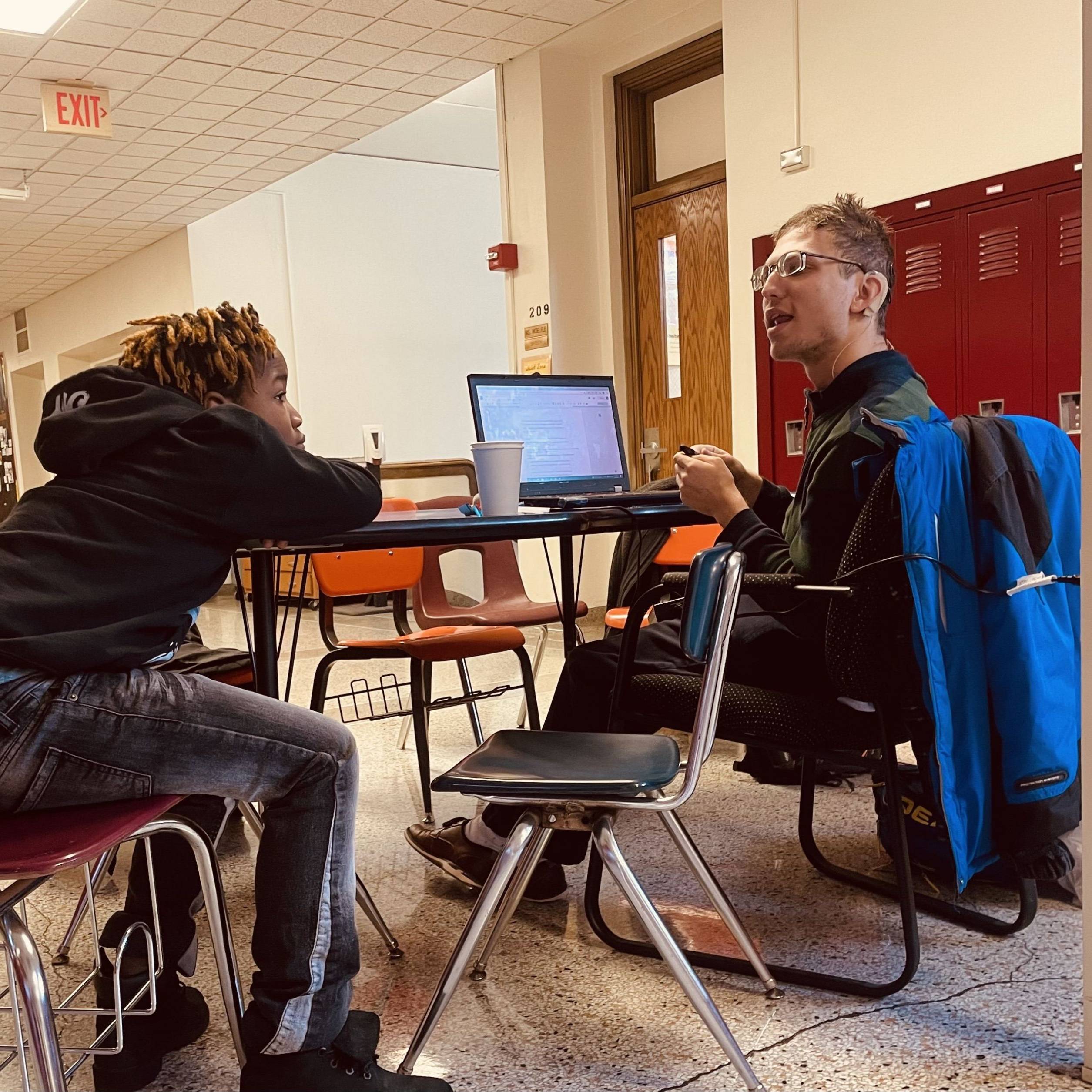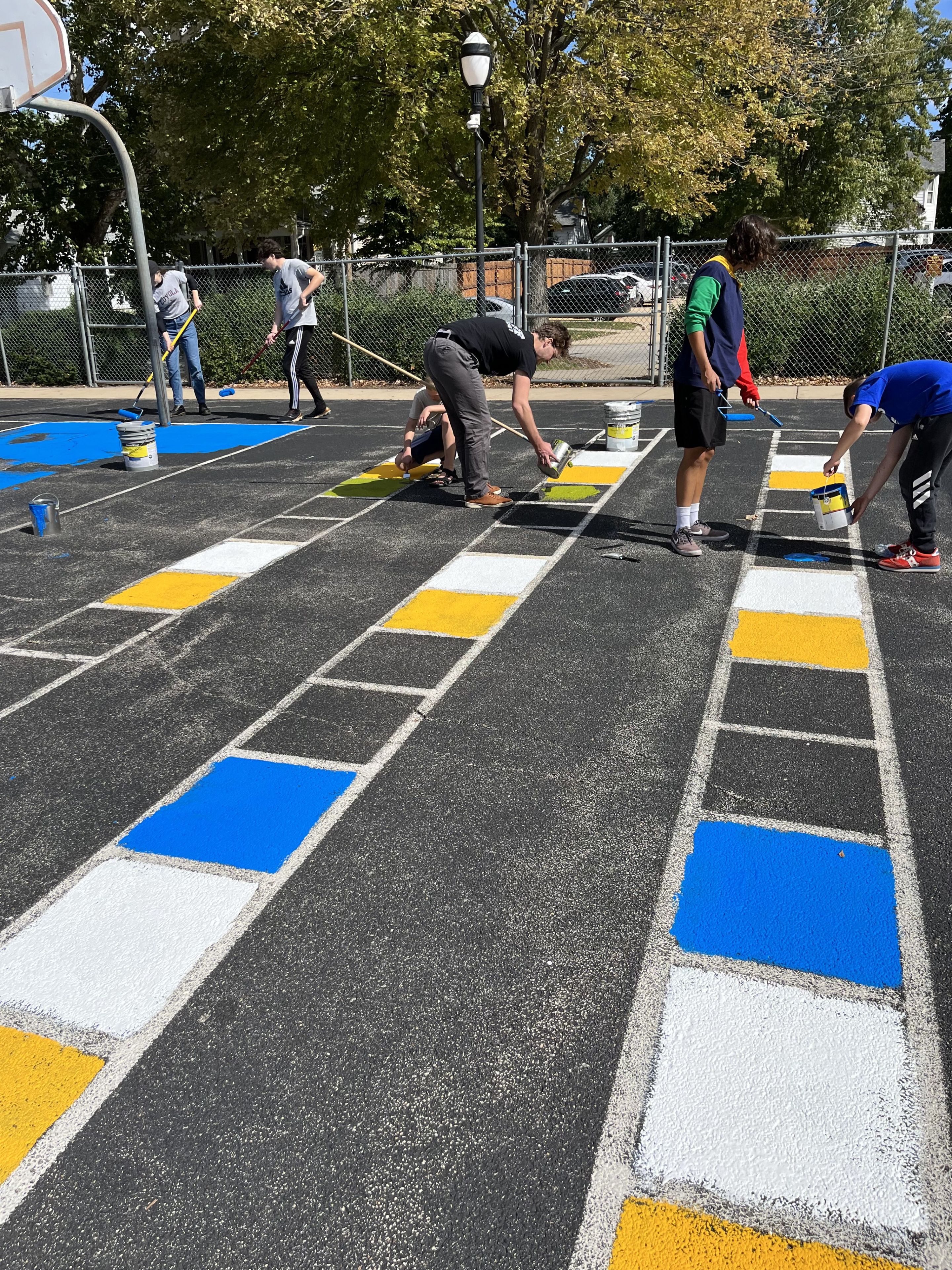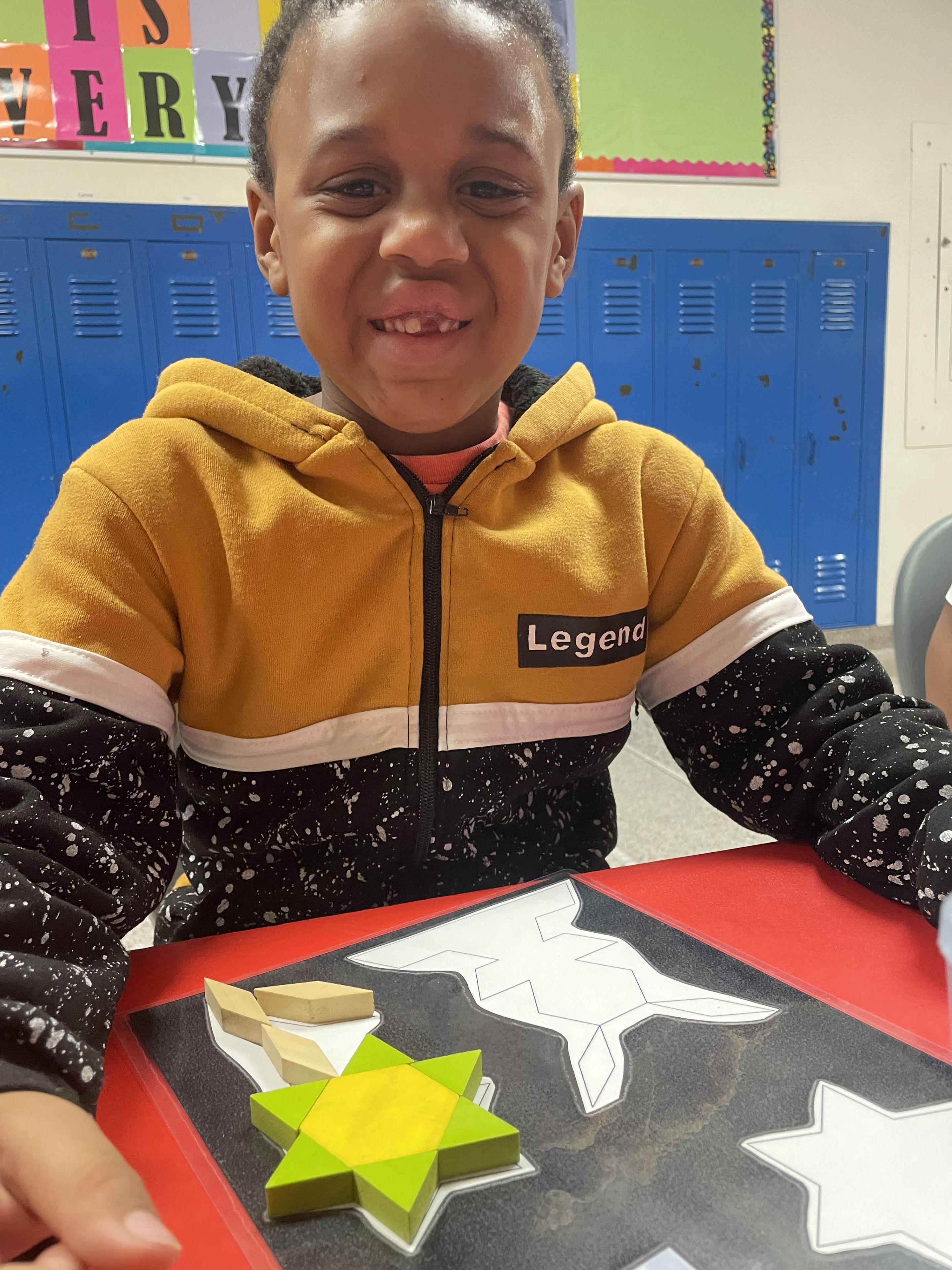RISING STARS
Dr. Laura Kalmes and her students are helping ‘superstars’ soar at Bent Elementary
RISING STARS
Dr. Laura Kalmes and her students are helping ‘superstars’ soar at Bent Elementary
Superstars at Bent Elementary School are soaring to new heights with a boost from some dedicated, empathetic, and engaging College of Education undergraduates.
“Our superstars look at the Illinois State students like they’re superheroes,” said Dan Zummo ’12, M.S. ’20, an instructional coach at Bent Elementary. “They’re blown away, and they’re excited.”
Dr. Laura Kalmes, a visiting professor in the Department of Educational Administration and Foundations, began partnering with Zummo last fall to infuse students from her philosophy of education and social foundations of education classes into Bent’s classrooms, hallways, and playground.
The students, who are typically working to fulfill their diverse field requirement, visit Bent on a weekly basis to assist with recess, co-regulation, and academic support. Involvement has grown from around 15 Illinois State sophomores, juniors, and seniors in the fall to more than 50 in the spring.
“What we’re doing with our teacher candidates in collaboration with the students at Bent who so generously and enthusiastically receive them, is we’re orienting them to address the real-world opportunities and challenges that are awaiting them in education—with trust and reciprocity and enthusiasm and hope,” Kalmes said.
Located in a historic west Bloomington neighborhood, Bent is a public school that serves more than 350 students—including Kalmes’ children—from diverse cultural and socioeconomic backgrounds. It is the hub for District 87’s bilingual program and has a roughly equal representation among Black students, Latinx students, and white students.
“I chose to start with Bent because it’s—in so many ways—a school that represents the best of us as a community,” Kalmes said. “It represents an opportunity for us to consider what happens if we really partner with and invest university resources in schools that are low income, and also, receive from them—because there’s a lot to learn in those spaces.”
Bent principal Guille Delgado ’06, M.A. ’11, M.S. ’19, and Zummo were eager to partner with Kalmes, who asked how her students could best support Bent’s teachers and learners. “Recess buddies” emerged from a need, identified by Bent’s teachers, to provide more student enrichment opportunities outside of the classroom setting.
Kalmes and her students began by brightening Bent’s plain blacktop with splashes of red, yellow, and blue paint on courts for basketball, soccer, four square, and hopscotch. Then, the “buddies” returned for recess.
Senior physical education and health major Francesco Cullotta was among the first recess buddies to arrive at Bent. While acquainting himself with the school, he noticed a few students kicking around a soccer ball.
“I was like, ‘OK, let’s get the students together, and then we’ll play a game,’” Cullotta said. “They were instantly up for it. They really enjoyed having a teacher playing with them. Every day after that they would come to me and be like, ‘Are we playing?’”
Cullotta’s soon-to-be-famous recess soccer games grew from three versus three players to seven versus seven. Students who had never played before decided to join the fun.
“We celebrated together when we scored, and I made sure to keep it friendly and inclusive,” Cullotta said. “I always made sure that everybody was involved. And that was one of the things I think that the students liked. They were all included in it. We had a bunch of people playing all the time.”
As the students played, they talked with Cullotta about anything and everything—from discussing their favorite soccer teams, to their school day, to challenges they faced at home. By engaging with students on a personal level, Cullotta said he gained trust, which enabled him to become a more impactful mentor.
“Building that connection makes them feel more involved and more included,” Cullotta said. “It makes them want to come to school and be present and engaged. It’s the difference between making a student want to be there, and not. It’s very important to me.”

College of education undergraduates provided academic support through the "learning buddies" program.

Community volunteers, including college of education undergraduates, helped paint the Bent Elementary playground.
In Kalmes’ Philosophy of Education course, Cullotta gained tools for establishing standards with students by being warm, yet firm. On the blacktop soccer pitch, he reiterated that everybody was invited to play the game.
“By the end of the semester, he had this really beautiful collaboration of students from all over the blacktop who just wanted to play soccer,” Kalmes said. “Those are the moments that we learn to build relationships, and it can happen around a ball on a blacktop.”

Bent Elementary students often greeted Illinois State's "Bent buddies" with a smile.
Back inside Bent, Kalmes and Zummo began working to fulfill another need related to classroom management: co-regulation, a trauma-informed strategy to address student behavior.
“When a student is dysregulated, there’s something going on,” Kalmes said. “They’re doing the best they can, but they are engaging in behavior that is not safe in the classroom. So, how can we support them?”
Kalmes recruited her students, including many special education majors, who—as “co-regulation buddies”—undertook additional reading and course work about trauma-informed care and co-regulation.
“I said, ‘You’re going to be first responders when kids are having a hard time. OK?’” Kalmes said. “I know the classroom teachers would love to help, but they have 24 other kids who really need them right now. ‘What if you all came into the school and were effectively on call when those kids need you?’ And we did it.”
Junior special education major Emma Reno seized the opportunity.
“I really like getting them down from dysregulation and just helping to regulate their emotions,” Reno said. “That’s one of the biggest parts of special education that interests me is just seeing how I can help others and how we can all work together.”
If a student was removed from their classroom for being disruptive, for example, Reno would sit with them in the hallway.
“We would talk to them about how they were feeling if they wanted, or we would just exist with them,” Reno said. “It involved us saying, ‘Hey, what’s up and how can I support you?’ And we acknowledged that what they’re feeling is valid.”
When working with a student experiencing dysregulation, Reno said it is important to model regulation through intentional breathing while acknowledging and validating their feelings.
“Just teaching them what that looks like and how to recover so they’re ready to go back into the classroom is important,” Reno said. “Building relationships with students is so important because you’re able to feel for them and understand them and also provide them with the resources that they need to learn and to feel safe.”
During the spring of 2023, Kalmes and her students added a third prong to their support for Bent: “learning buddies.”
“When we asked teachers, and students, and community folks, ‘What else do we need?’ we kept hearing, ‘We need learning support,’” Kalmes said. “Kids, especially at low-income schools, lost a lot of learning time (due to the COVID-19 pandemic). And we see the impact in reading scores and in math scores.
“And even though our presence there is much bigger and more holistic than just numbers and data, we also recognize that it creates a lot of stress for kids when they’re behind their peers.”
As a learning buddy, Illinois State students work with Bent’s teachers to either pull students or enter classrooms to provide individualized instruction and support.
“It’s been overwhelmingly beautiful to see kids in the hallways reading together and laughing together with their learning buddies,” Zummo said.
Through all three initiatives—recess buddies, co-regulation buddies, and learning buddies—Kalmes said her students are striving to help Bent’s dedicated teaching staff meet their superstars’ needs socially, emotionally, and academically.
“I love that our ISU students are like rock stars when they show up—the kids are so happy to see them, and the teachers really appreciate their presence,” Kalmes said. “And so, the program continues to evolve.”
Kalmes, who will become interim director of the Center for the Study of Education Policy this fall, is unsure what the future of the Bent program holds, but she expects teachers and students to continue informing its path—as they’ve done since the beginning. And, although the program remains intentionally fluid, Kalmes said the impact on Illinois State’s pre-service teachers is solid.
“They’ll take into their future classrooms the courage to trust kids and communities, the curiosity to understand problems broadly instead of prescribing narrow solutions, and a real commitment to leveraging the resources of communities to solve those problems,” Kalmes said.
“When we reposition ourselves alongside our learners, our families, and our communities, it creates a relationship internally that is more trusting and creative. And I see that as being the transformation that our schools need for a future that promises better outcomes and experiences for all of us at the community level and at the democratic level.”